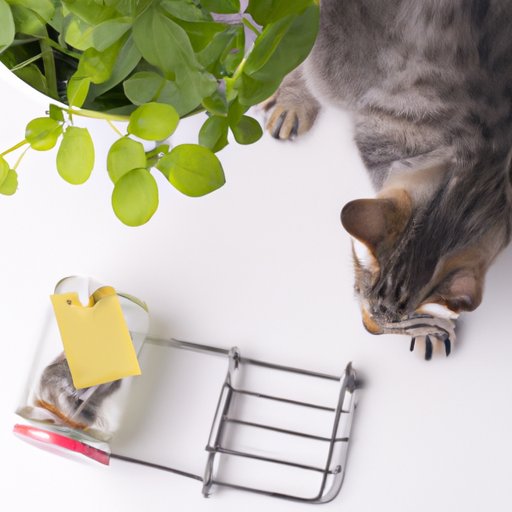
I. Introduction
If you’ve ever had a mouse problem in your home, you know how frustrating and unsettling it can be. Mice can cause damage to your property, leave droppings throughout your house, and even spread diseases. While there are many commercial products available to get rid of mice, many of them use harsh chemicals or inhumane methods. That’s why finding natural solutions to address the issue is essential. In this article, we will explore some of the most effective and humane methods to get rid of mice naturally.
II. Seal Potential Entry Points
The first step in preventing mice infestation is to seal any potential points of entry. Mice can fit through even the smallest cracks or gaps, so it’s essential to be thorough in your search for entry points.
Start by inspecting the exterior of your house, looking for gaps and cracks in the foundation, siding, and around windows and doors. Use caulk, expanding foam, or weatherstripping to seal any identified entry points. You can also use metal mesh or hardware cloth to reinforce areas that are particularly vulnerable to rodent intrusion.
III. Use Peppermint Oil
Peppermint oil is a natural repellent for mice. The scent of peppermint is intolerable for mice, making them avoid the areas where it is present. To use peppermint oil as a mouse deterrent, place cotton balls soaked in peppermint oil in areas where mice are likely to frequent, such as near food storage or entry points.
If you prefer a more natural approach, you can also use fresh peppermint leaves. Place them around your house in sachets or scatter them in places where mice are likely to hide.
IV. Keep Your House Clean
Keeping your home clean and free of food scraps is a crucial step in deterring mice from your property. Mice are attracted to food and clutter, so it’s essential to keep things tidy, especially in the kitchen.
Always clean up after meals and store food in airtight containers, making it inaccessible to mice. Regularly clean the floors, countertops, and other surfaces and dispose of garbage promptly. By denying mice access to food and water, you’re making your home a less hospitable environment for them.
V. Set Up Humane Traps
Humane traps are an excellent alternative to poison or glue traps. They allow you to catch the mice alive and release them safely outside your home. Choose a trap that is appropriate for the size of the mice living in your house, and bait it with peanut butter or another tasty food. Be sure to check the traps regularly and release any trapped mice far away from your home.
VI. Use Natural Deterrents
Cloves, cayenne pepper, and garlic are all natural deterrents that have a strong scent mice dislike. Place cloves of garlic or sprinkle cayenne pepper or to areas where mice are likely to frequent. You can also make a spray by combining garlic or cayenne pepper with water and spraying the areas you want to protect.
However, be careful not to overuse natural deterrents, as they can lose their effectiveness over time. Rotate the type of repellent you use every few weeks to keep them fresh and potent.
VII. Get a Cat
Cats are an excellent solution to mice infestation, provided you’re not allergic and can take care of them properly. Cats are natural predators and often enjoy hunting mice. However, the breed, age, and personality of the cat you choose will have an impact on their ability to hunt mice effectively.
When selecting a cat, choose the breed that is known for being good hunters, such as Siamese, Manx, or Maine Coon. Kittens are often more successful at catching mice than adult cats, and a cat with a high prey drive will be more effective than a laid-back cat that’s not interested in hunting. If you’re not sure you’re ready to care for a cat full-time, consider fostering a cat from a local shelter instead.
VIII. Conclusion
When it comes to finding natural solutions to mice infestation, there are many effective and humane options available. Whether you choose to seal up potential entry points, use natural deterrents, or get a cat, it’s important to act swiftly and decisively to address the problem. By trying some of the methods outlined in this article, you can take a proactive approach to keeping your home free of mice.
Remember to choose the best natural method for your specific problem and always prioritize the safety and well-being of yourself and the mice.




